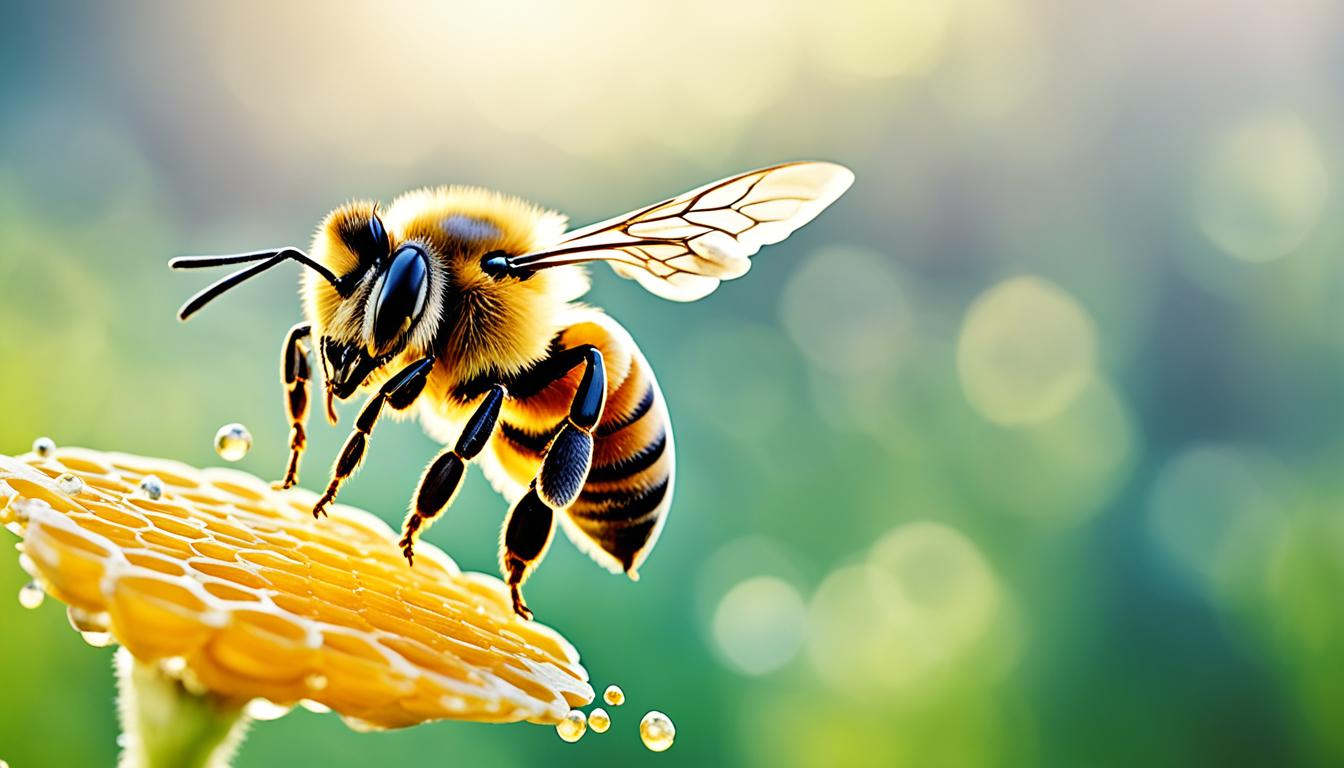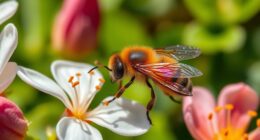Mentoring programs for beekeepers connect you with experienced apiarists who can share invaluable insights and hands-on skills. You'll learn best practices, tackle challenges together, and benefit from real-time feedback. By engaging with local beekeeping associations and attending workshops, you can easily find a mentor who understands your journey. These connections not only enhance your skills but also help you build a supportive community of fellow beekeepers. As you grow in this journey, you'll refine your approach and deepen your understanding of bee welfare. Explore how these mentoring opportunities can elevate your beekeeping experience even further.
Key Takeaways
- Local beekeeping associations often offer structured mentorship programs connecting beginners with experienced beekeepers for hands-on learning and support.
- Mentorship provides real-time problem-solving opportunities, allowing new beekeepers to discuss challenges and receive tailored advice from seasoned professionals.
- Engaging in workshops and events facilitates networking with both mentors and peers, enhancing knowledge sharing and community building within beekeeping.
- Access to experienced beekeepers through mentorship programs promotes the adoption of best practices and improves overall hive management skills.
- Participation in mentorship fosters a supportive environment where novice beekeepers can gain confidence and practical experience in managing bee colonies.
Prerequisites for Beekeeping

Before diving into beekeeping, it's essential to understand the prerequisites that pave the way for success. First, take a moment to assess your motivation and time commitment. Beekeeping isn't a one-time task; it involves ongoing care for your honeybees and their environment.
Additionally, consider the importance of financial planning for your beekeeping endeavors, similar to how caregivers manage financial considerations for elderly care. Next, consider your financial resources. You'll need to cover costs for beekeeping materials and education, so budgeting is necessary before you get started.
You'll also need a suitable space for working and storing your beekeeping supplies. Having an organized area will help you manage your equipment and conduct hive activities more effectively.
Additionally, it's important to make sure you don't have any insect sting allergies. This will greatly impact your ability to work safely with your bees.
Lastly, understanding your personal commitment and responsibilities is essential. Beekeeping can be rewarding, but it requires dedication and effort.
Importance of Continuous Learning

Continuous learning is essential for beekeepers enthusiastic to thrive in this ever-evolving field. Staying updated on the latest research and best practices is fundamental for maintaining the health and productivity of your colonies.
Engaging with experienced beekeepers through mentorship programs can offer invaluable practical knowledge that complements your theoretical understanding. As curiosity drives innovation in beekeeping practices, it can also lead to enhanced problem-solving abilities through diverse perspectives and experiences.
Attending workshops and participating in local beekeeping associations not only fosters community engagement but also encourages knowledge sharing among beekeepers of varying experience levels. This collaborative environment allows you to learn from others' successes and mistakes, enhancing your own beekeeping skills.
Ongoing education is essential for adapting to new challenges, such as shifting climate conditions and emerging bee diseases, which can seriously impact hive health.
By utilizing diverse learning resources, like online courses and hands-on training, you can implement sustainable and responsible practices in your apiary.
Ultimately, committing to continuous learning empowers you to make informed decisions, ensuring your beekeeping journey is both productive and rewarding.
Embrace the opportunities for growth and development, and watch your beekeeping skills flourish.
Finding a Mentor
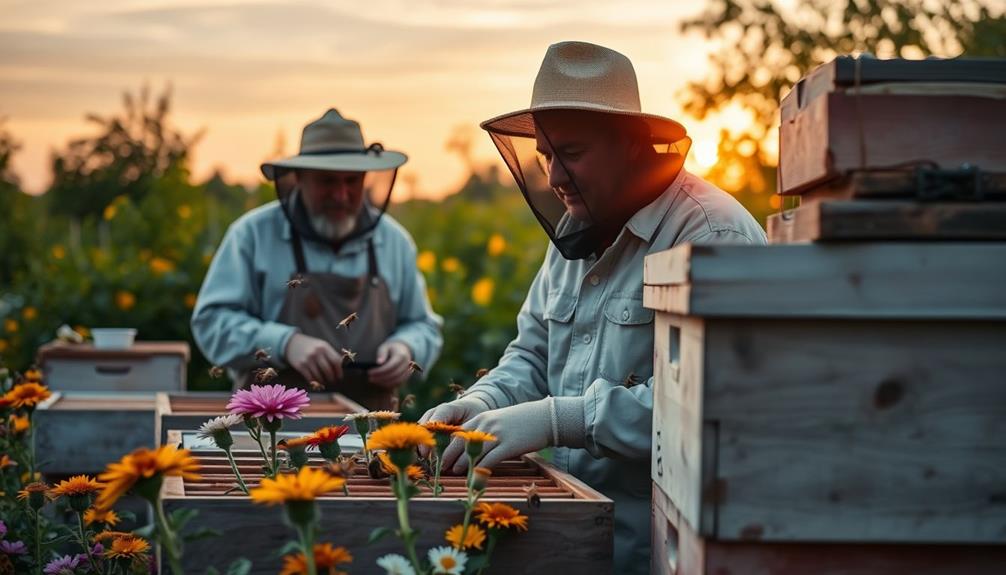
Finding a mentor in the beekeeping community can greatly enhance your learning experience and boost your confidence as a new beekeeper. Start by reaching out to local beekeeping associations, as they often provide valuable resources to connect you with experienced mentors. These associations typically have established networks and can guide you toward individuals enthusiastic to share their knowledge.
Additionally, consider the importance of community engagement, as forming connections with fellow beekeepers can lead to discovering hidden gems in your local area, similar to scenic views and natural beauty that enhance outdoor experiences.
Don't underestimate the power of social media and online forums. Platforms dedicated to beekeeping can help you network with aspiring and seasoned beekeepers alike. By engaging in discussions, you might find potential mentors in your area who are ready to offer guidance.
Additionally, recommendations from community members can be invaluable. Ask fellow beekeepers who they trust; they can point you toward knowledgeable mentors. Many experienced beekeepers are willing to offer free consultations, making mentorship accessible without a hefty financial commitment.
Lastly, consider attending local beekeeping events or workshops. These gatherings provide perfect opportunities to meet potential mentors face-to-face, allowing for a more personal connection. By actively seeking out these avenues, you'll find the right mentor to support your beekeeping journey.
Engaging With the Community
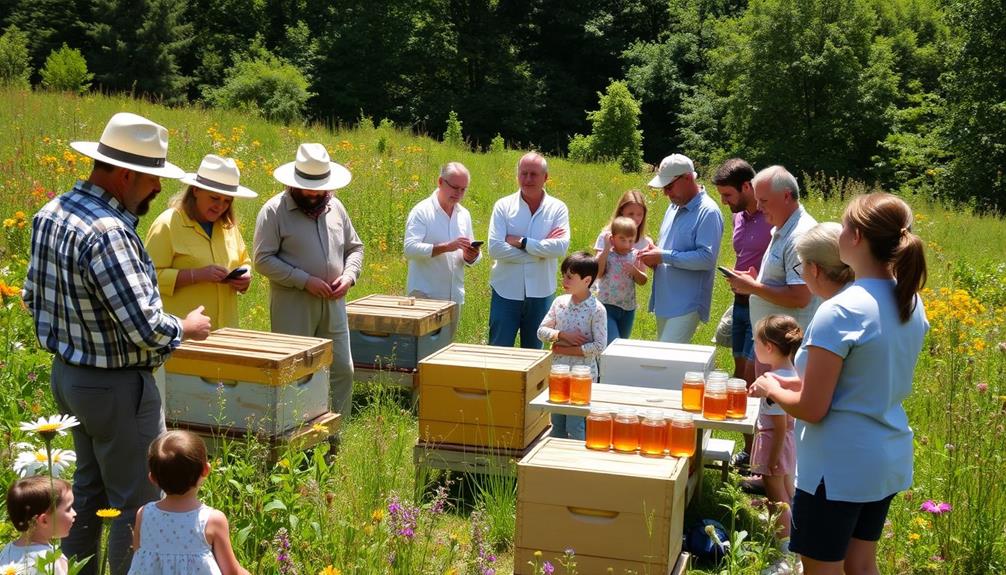
Engaging with the beekeeping community is essential for new beekeepers looking to thrive in their craft. By joining local beekeeping associations, you can connect with experienced beekeepers who are ready to mentor you. Social media platforms and forums are also fantastic places to ask questions, share experiences, and gain insights from seasoned practitioners.
Many organizations offer free consultation services, allowing you to receive personalized advice and support from mentors. Participating in community events and workshops not only enhances your practical skills but also helps you build connections with fellow beekeepers. Sharing your challenges and successes fosters collective learning, encouraging responsible practices.
Here's a quick look at the benefits of engaging with the community:
| Benefit | Description | Emotional Impact |
|---|---|---|
| Networking | Connect with experienced beekeepers | Sense of belonging |
| Learning | Gain practical skills through workshops | Confidence in your abilities |
| Support | Access to personalized advice | Relief through shared wisdom |
| Sharing Experiences | Exchange stories with others | Encouragement and motivation |
| Collective Growth | Learn from each other's successes and failures | Fulfillment in community success |
Engaging is truly the key to your beekeeping journey!
Essential Beekeeping Equipment

When you start beekeeping, having the right equipment is vital for your success and safety.
You'll need protective gear like bee suits and gloves to shield yourself from stings, along with essential tools like a smoker and hive tool for effective hive management.
Don't forget about quality hive components, as they play a key role in maintaining your bees' health and productivity.
Must-Have Tools
Successful beekeeping hinges on having the right tools at your disposal. First and foremost, a sturdy hive is fundamental for providing shelter and structure for your bees.
You'll also need quality hive components, like frames and foundation, to guarantee your colonies thrive. A reliable bee feeder is critical for supplementing nutrition, particularly in early spring or during times of scarce forage.
To manage your hive effectively, invest in a hive tool for inspecting and maintaining the structure. A smoker is another must-have; it calms the bees during inspections, making the process safer and more efficient.
Don't forget about a honey extractor, which allows you to harvest honey without damaging the comb, promoting sustainable practices.
While protective gear, like a beekeeper suit and gloves, is essential for safety, we won't explore that just yet.
Focus on these fundamental tools to build a strong foundation for your beekeeping journey. With the right equipment, you'll set yourself up for success and guarantee the health and productivity of your bee colonies.
Protective Gear Importance
Protective gear plays an essential role in ensuring your safety while managing hives, making it an indispensable part of beekeeping. When you approach your bees, wearing a well-fitted bee suit made of lightweight, breathable fabric is fundamental. This not only keeps you comfortable but also provides adequate protection from stings.
Gloves are another important component, helping you maintain dexterity while handling bees and hive equipment. You can choose from leather, rubber, or synthetic options, each designed to offer protection without sacrificing your ability to work effectively.
Don't overlook the importance of veils, which shield your face and neck—common sting zones. They come in various styles, including detachable or integrated into the suit, catering to your preferences.
Investing in high-quality protective gear enhances your safety and boosts your confidence in beekeeping.
Whether you're a beginner or an experienced apiarist, feeling secure in your protective attire allows you to focus on your bees without fear. Equip yourself properly, and you'll create a safer, more enjoyable beekeeping experience.
Essential Hive Components
A beekeeper's success hinges on understanding the essential components of a hive. Each part plays a critical role in maintaining a healthy colony. The brood chamber is where the queen lays eggs, while frames hold the honeycomb, providing structure for the colony.
Here's a quick overview of essential hive components:
| Component | Function | Importance |
|---|---|---|
| Brood Chamber | Where the queen lays eggs | Essential for colony reproduction |
| Frames | Holds honeycomb | Supports the colony's structure |
| Hive Cover | Protects bees from the elements | Keeps the hive insulated and safe |
| Bottom Board | Allows ventilation and pest control | Essential for hive health |
| Smokers | Calms bees during inspections | Helps manage bee behavior |
| Bee Feeders | Provides supplemental nutrition | Supports colony growth, especially in dearth periods |
Additionally, protective gear like gloves and veils guarantees your safety during inspections. Investing in these components not only safeguards your bees but also enhances your beekeeping experience. Understanding these essentials will set you on the path to becoming a successful beekeeper.
Sourcing and Managing Bees
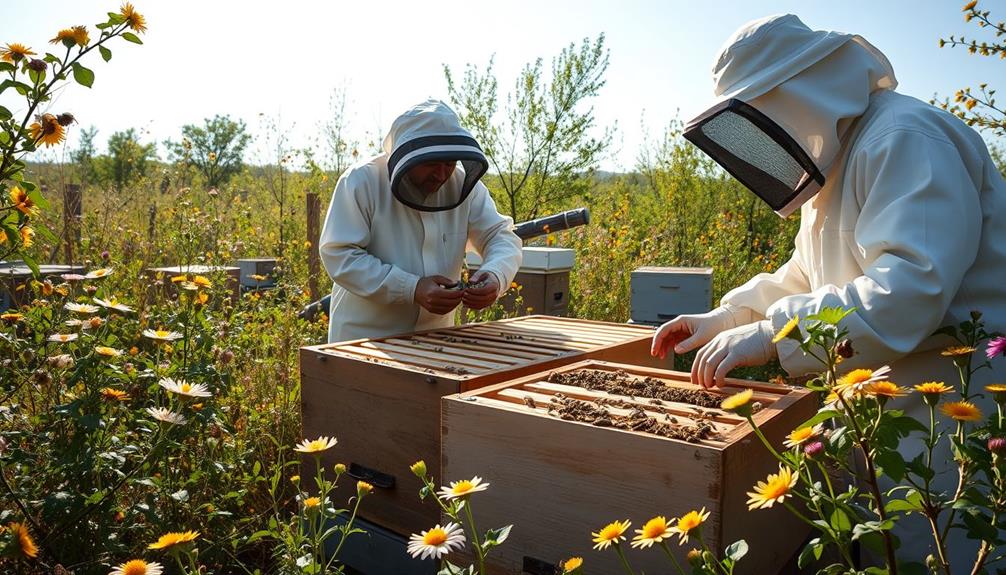
When starting your beekeeping journey, choosing the right source for your bees is essential. Beginners often find that starting with a nucleus colony, or "nuc," is the best option. These smaller, manageable colonies allow you to learn the ropes without feeling overwhelmed.
It's important to research reputable sources for purchasing bees, ensuring you acquire healthy colonies suited for your local environment.
Understanding how quickly bee populations can grow, especially in spring, will help you plan for future expansion and management strategies. Consulting with experienced beekeepers or mentors can provide invaluable insights into selecting the right bee species tailored to your area's conditions and your honey production goals.
Before making a purchase, verify the health status and lineage of the bees. This step is critical to avoid introducing diseases or genetic issues into your apiary, which could hinder your beekeeping success.
Practical Experience in Beekeeping
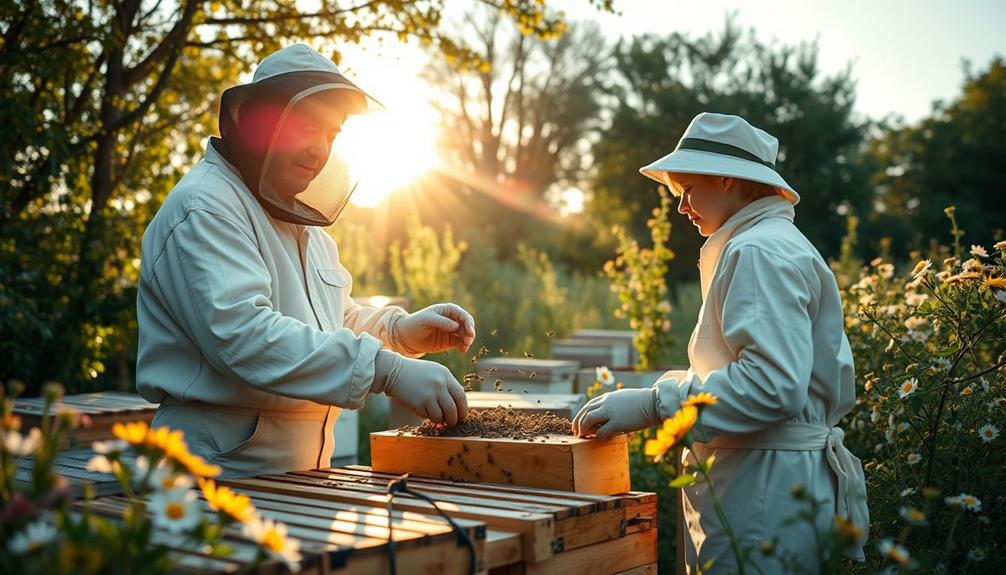
Getting hands-on training is key to becoming a successful beekeeper.
By shadowing experienced beekeepers, you can learn the ropes and gain insights that textbooks just can't provide.
This practical experience will help you develop the skills needed to manage your hives effectively.
Hands-On Training Opportunities
Hands-on training opportunities are essential for new beekeepers enthusiastic to develop their skills in hive management. These practical sessions complement theoretical courses, allowing you to apply what you've learned directly to real hive management scenarios. Each session typically lasts around two hours, focusing on vital techniques like hive inspections and bee handling.
Participating in these hands-on trainings helps you gain confidence and competence in managing your bee colonies effectively while understanding bee behavior dynamics. Many beekeeping courses require practical training as a mandatory component, ensuring you can translate your theoretical knowledge into actionable skills in a supportive environment.
Local beekeeping associations frequently organize practical workshops where you can work directly with experienced mentors, gaining valuable insights and hands-on experience.
| Session Focus | Expected Outcome |
|---|---|
| Hive Inspections | Learn how to assess colony health |
| Bee Handling | Master safe and effective techniques |
| Problem Solving | Develop strategies for common issues |
Engaging in these opportunities enriches your learning journey, making you a more capable and confident beekeeper. Don't miss out on the chance to grow through practical experience!
Shadowing Experienced Beekeepers
Many new beekeepers find that shadowing experienced beekeepers is one of the most effective ways to gain practical experience. This hands-on approach complements the theoretical knowledge you've acquired from courses and books. By engaging in direct observation and participating in hive management, you'll learn practical techniques for bee handling in real-time, which is invaluable.
Mentoring relationships create a supportive learning environment. You can freely ask questions and receive immediate feedback from seasoned professionals, helping you refine your skills. Many local beekeeping associations facilitate shadowing opportunities, connecting you with experienced beekeepers in your community. This shared learning experience not only enhances your understanding of beekeeping but also builds connections within the beekeeping community.
The practical experience you gain through shadowing can greatly boost your confidence and competence in managing your own hives. Watching skilled beekeepers tackle common challenges and apply best practices equips you with the knowledge to handle similar situations in the future.
Developing a Beekeeping Network
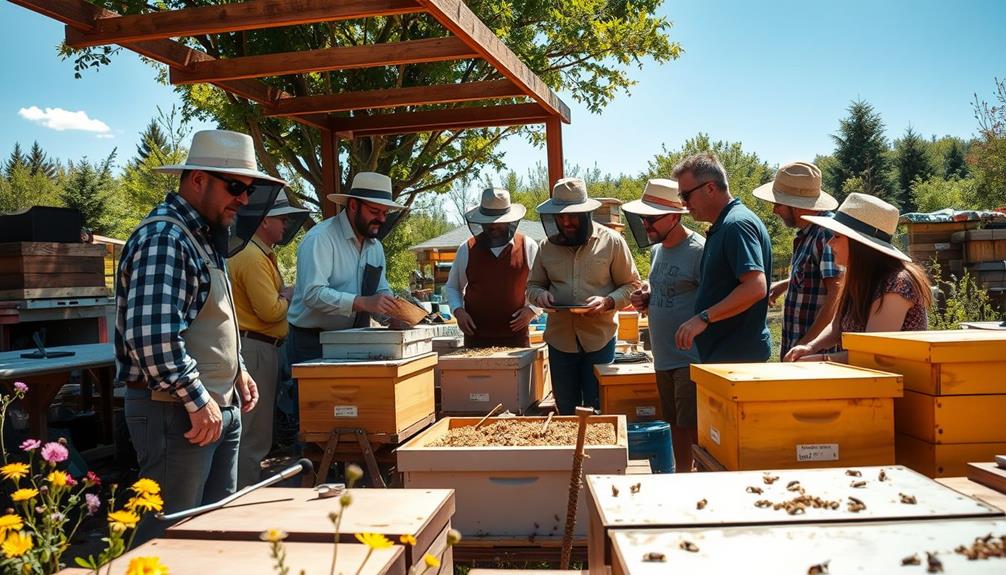
Building a robust beekeeping network is essential for both novice and experienced beekeepers alike. By joining local beekeeping associations, you gain access to a wealth of knowledge from seasoned beekeepers who can offer mentorship and guidance. Engaging with online forums and social media groups dedicated to beekeeping also helps you connect with others in the community, fostering collaborative learning experiences.
Participating in workshops and training sessions hosted by local clubs enhances your understanding of best practices and expands your professional network. Don't hesitate to seek recommendations from fellow beekeepers or community members to identify potential mentors willing to share their expertise. Utilizing free consultation services offered by beekeeping associations can provide you with personalized advice and help establish valuable connections.
Here's a quick overview of ways to develop your beekeeping network:
| Method | Benefits |
|---|---|
| Local associations | Access to experienced mentors |
| Online forums | Connection with a broader community |
| Workshops and training | Hands-on experience and networking |
Building relationships within the beekeeping community will not only enhance your skills but also make your journey more enjoyable.
Commitment to Bee Welfare
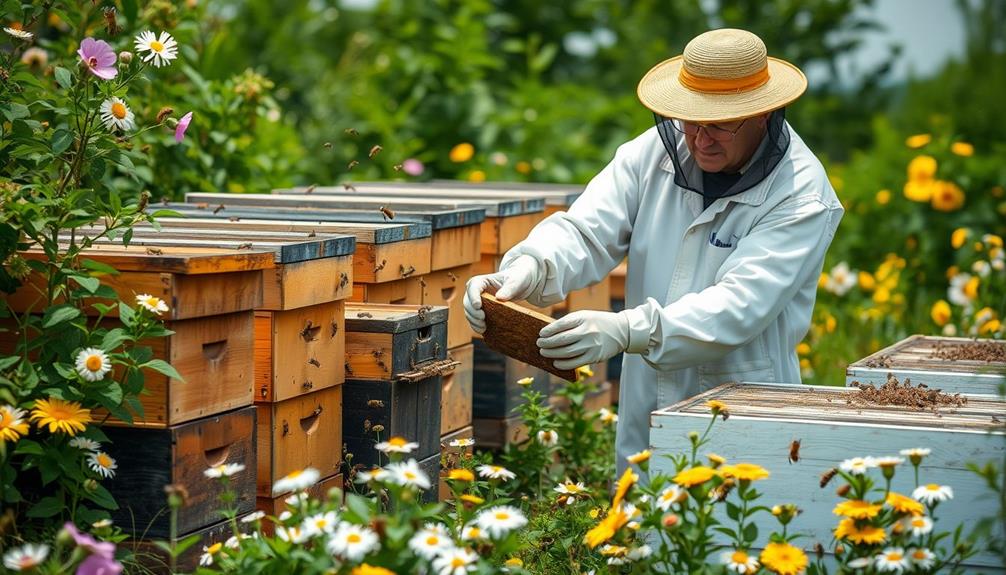
A commitment to bee welfare is essential for any beekeeper who wants to guarantee their colonies thrive.
Understanding the natural behaviors and needs of honeybees is vital for their health and productivity. You'll need to adopt responsible beekeeping practices to maintain robust bee populations. This means minimizing pesticide use and ensuring your bees have adequate nutrition.
Consider these key practices to enhance bee welfare:
- Educate yourself on bee diseases and pests to reduce risks.
- Provide suitable habitats and nesting options to encourage thriving colonies.
- Avoid overcrowding in your hives to promote a healthy environment.
- Engage in continuous learning through workshops and courses.
- Join mentorship programs with experienced beekeepers to share knowledge and best practices.
Frequently Asked Questions
How Much Does a Beekeeping Course Cost?
A beekeeping course typically costs around €480 for both theoretical and practical components. Online options vary in price, and many programs offer flexible payment plans to help you manage the costs effectively.
How Does One Learn Beekeeping?
You can learn beekeeping through hands-on experiences with local mentors, attending workshops, enrolling in courses, and participating in practical training sessions. Stay updated with blogs and books to enhance your knowledge and skills continuously.
How Much Does a Beekeeper Earn During Training?
During training, beginner beekeepers typically earn between €1,000 and €3,000 annually. As you gain experience and knowledge, your income can rise considerably, potentially reaching €30,000 to €50,000 with successful honey production or services.
Can You Become a Beekeeper Without Formal Training?
Absolutely, you can become a beekeeper without formal training. Many have thrived through hands-on experience, mentorship, and community support. Engaging with local beekeepers and utilizing online resources can greatly boost your beekeeping skills.
Conclusion
So, before you dive headfirst into beekeeping, remember: it's not just about slapping on a bee suit and hoping for honey. You'll want a mentor to guide you, or you might end up with a swarm in your hair instead of sweet nectar in your jar. Engage with your community, gather your gear, and nurture those buzzing buddies. After all, no one wants a hive of angry bees buzzing around like they just found out their Wi-Fi's down!


